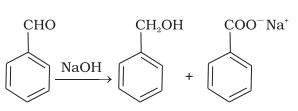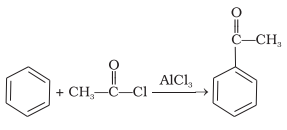Among acetic acid, phenol and n-hexanol which one of the following compound will react with NaHCO3 solution to give sodium salt and CO2?
1. Acetic acid
2. n-hexanol
3. Acetic acid and phenol
4. Phenol

To unlock all the explanations of 20 chapters you need to be enrolled in MasterClass Course.

To unlock all the explanations of 20 chapters you need to be enrolled in MasterClass Course.
The following reaction,

Is known by the name
1. Friedel-Crafts reaction
2. Perkins reaction
3. Acetylation reaction
4. Schotten-Baumann reaction
Cannizaro’s reaction is not given by _____________.
1. 
2. 
3. HCHO
4.

To unlock all the explanations of 20 chapters you need to be enrolled in MasterClass Course.

To unlock all the explanations of 20 chapters you need to be enrolled in MasterClass Course.
Match the common names given in Column I with the IUPAC names given in Column II.
Column I Column II
(Common names) (IUPAC names)
(i) Cinnamaldehyde (a) Pentanal
(ii) Acetophenone (b) Prop-2-enal
(iii) Valeraldehyde (c) 4-Methylpent-3-en-2-one
(iv) Acrolein (d) 3-Phenylprop-2-enal
(v) Mesityl oxide (e) 1-Phenylethanone
1. (i)-(d), (ii)-(e), (iii)-(a), (iv)-(b), (v)-(c)
2. (i)-(c), (ii)-(d), (iii)-(e), (iv)-(b), (v)-(a)
3. (i)-(a), (ii)-(d), (iii)-(b), (iv)-(c), (v)-(e)
4. (i)-(d), (ii)-(e), (iii)-(c), (iv)-(a), (v)-(b)

To unlock all the explanations of 20 chapters you need to be enrolled in MasterClass Course.

To unlock all the explanations of 20 chapters you need to be enrolled in MasterClass Course.
Match the acids given in Column I with their correct IUPAC names given in Column II and mark the appropriate option.
| Column I (Acids) |
Column I (IUPAC names) |
||
| (i) | Phthalic acid | (a) | Hexane-1,6-dioic acid |
| (ii) | Oxalic acid | (b) | Benzene-1,2-dicarboxylic acid |
| (iii) | Succinic acid | (c) | Pentane-1,5-dioic acid |
| (iv) | Adipic acid | (d) | Butane-1,4-dioic acid |
| (v) | Glutaric acid | (e) | Ethane-1,2-dioic acid |
1. (i) — (a), (ii) — (b), (iii) — (c), (iv) — (d), (v) — (e)
2. (i) — (b), (ii) — (e), (iii) — (d), (iv) — (a), (v) — (c)
3. (i) — (b), (ii) — (a), (iii) — (d), (iv) — (e), (v) — (c)
4. (i) — (a), (ii) — (e), (iii) — (c), (iv) — (b), (v) — (d)

To unlock all the explanations of 20 chapters you need to be enrolled in MasterClass Course.

To unlock all the explanations of 20 chapters you need to be enrolled in MasterClass Course.
Match the reactions given in Column I with the suitable reagents given in Column II.
| Column I (Reactions) |
Column II (Reagents) |
||
| (i) | Benzophenone → Diphenylmethane | (a) | LiAlH4 |
| (ii) | Benzaldehyde → 1-Phenylethanol | (b) | DIBAL—H |
| (iii) | Cyclohexanone → Cyclohexanol | (c) | Zn(Hg)/Conc. HCl |
| (iv) | Phenyl benzoate → Benzaldehyde | (d) | CH3MgBr |
1. (i) — (a), (ii) — (b), (iii) — (d), (iv) — (c)
2. (i) — (b), (ii) — (c), (iii) — (a), (iv) — (d)
3. (i) — (c), (ii) — (d), (iii) — (a), (iv) — (b)
4. (i) — (d), (ii) — (c), (iii) — (b), (iv) — (a)

To unlock all the explanations of 20 chapters you need to be enrolled in MasterClass Course.

To unlock all the explanations of 20 chapters you need to be enrolled in MasterClass Course.
Match the example given in Column I with the name of the reaction in Column II.
|
|
Column I |
|
Column II |
|
(i) |
(a) |
Friedel Crafts acylation |
|
|
(ii) |
|
(b) |
HVZ reaction |
|
(iii) |
|
(c) |
Aldol condensation |
|
(iv) |
(d) |
Cannizaro’s reaction |
|
|
(v) |
(e) |
Rosenmund’s reduction |
|
|
(vi) |
(f) |
Stephen’s reaction |
1. (i) — (c), (ii) — (a), (iii) — (d), (iv) — (b), (v) — (f), (vi) — (e)
2. (i) — (b), (ii) — (c), (iii) — (a), (iv) — (d), (v) — (f), (vi) — (e)
3. (i) — (a), (ii) — (b), (iii) — (c), (iv) — (d), (v) — (e), (vi) — (f)
4. (i) — (e), (ii) — (d), (iii) — (a), (iv) — (b), (v) — (f), (vi) — (c)

To unlock all the explanations of 20 chapters you need to be enrolled in MasterClass Course.

To unlock all the explanations of 20 chapters you need to be enrolled in MasterClass Course.
The reagent used for the separation of acetaldehyde from acetophenone is
1. NaHSO3
2. C6H5NHNH2
3. NH2OH
4. NaOH and I2

To unlock all the explanations of 20 chapters you need to be enrolled in MasterClass Course.

To unlock all the explanations of 20 chapters you need to be enrolled in MasterClass Course.
Two isomeric ketones 3-Pentanones and 2-pentanone can be distinguished by
1. I2/NaOH only
2. NaHSO3 only
3. NaCN/HCl
4. Both of (a) and (b)

To unlock all the explanations of 20 chapters you need to be enrolled in MasterClass Course.

To unlock all the explanations of 20 chapters you need to be enrolled in MasterClass Course.
What is the major organic product formed from the following reaction?
| 1. |  |
2. |  |
| 3. |  |
4. |  |

To unlock all the explanations of 20 chapters you need to be enrolled in MasterClass Course.

To unlock all the explanations of 20 chapters you need to be enrolled in MasterClass Course.









